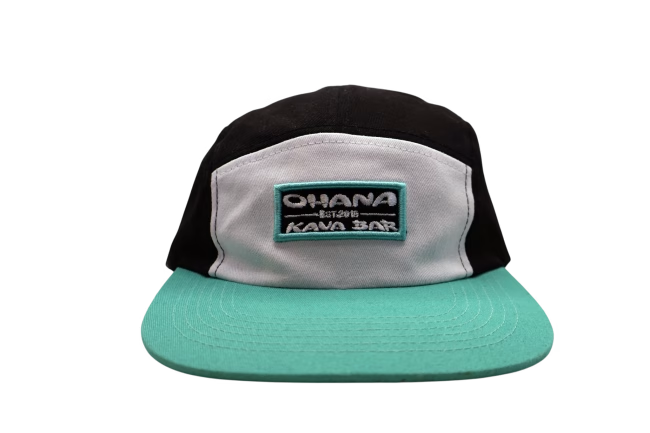This isn’t just a drink.
It’s a movement. A ritual. A new way to connect.
A quiet rebellion against the noise, the pressure, and the buzz.
At Ohana Kava Bar, we’re reimagining what it means to unwind… without alcohol and without judgment.
Because relaxation shouldn’t come with a hangover, and connection shouldn’t need a buzz.
From our tropical-inspired spaces to our plant-powered elixirs, every detail is crafted to help you unwind and reconnect, naturally.
Whether you’re sipping in one of our bars, browsing online, or dreaming of bringing the Ohana experience to your city – you’re already part of something bigger.
This is the future of conscious community… one shell at a time.
Bula!
Discover the tradition of kava —click here to explore how this time-honored Pacific Island root has been enjoyed for centuries as a natural way to unwind and stay present.
Step right into a Hawaiian hide-away, with a tropical themed interior design showcasing surfboards, tiki art, mermaids, and so much more!🍹
Discover the tradition spanning millennia – with traditional kava tea and premium kava extracts, we got your kava needs covered.🌿
We got something for everyone. So even if kava is not your thing or you are not ready to try it, we got a huge selection of loose-leaf teas. Also, we got the java to keep you going. ☕🍵
We have music nearly every weekend, regular themed trivia nights, bingo, art showcases, theme nights, comedy, and more. At Ohana, we want to get rid of that idea you need alcohol to have fun, and prove it very wrong.🎶

At Ohana, we don’t just serve drinks — we cultivate connection.
Whether you're an artist seeking flow, a gamer catching your breath between matches, or a couple looking for an alcohol-free date night, our spaces are designed to hold you exactly as you are.
This is your third place — a tropical refuge where intention meets community. Where presence replaces pressure. And where each sip tells a story rooted in ancient ritual and modern well-being.
✨ Kava – Earthy and grounding. Encourages mindful calm, gentle sociability, and presence.
✨ Kratom – Traditionally used to support mood, focus, and uplifted clarity.
✨ Hemp (CBD) – Soothing support for body and mind, often used to promote balance and wellness.
For customers, it’s an invitation to unwind without compromise.
For partners and franchisees, it’s a movement ready to grow.
In a world that runs on overdrive, Ohana Kava Bar offers a pause. A place to gather, ground, and reconnect — not just with others, but yourself.
Our locations in Colorado Springs — from the lively heartbeat of Boulder Street downtown to the calming flow of North Academy — are more than bars. They’re islands of intention. Designed with tropical soul and rooted in ancient ritual, each Ohana invites you into a new kind of experience: slower, softer, and alcohol-free.
Whether you’re stepping into one of our physical spaces, exploring our elixirs online, or dreaming of creating an Ohana of your own — you’re already part of a rising movement. One that’s rewriting the rules of relaxation, one shell at a time.
This Isn’t Just a Trend — It’s a Return to Ritual
Kava. Kratom. Hemp-based elixirs. At Ohana, these aren’t novelties — they’re sacred tools, rediscovered for a new generation.
Our guests — and our partners — are drawn to more than the drinks. They come for the feeling: the grounded calm, the shared presence, the clear-headed connection. No alcohol. No anxiety. Just a quiet shift toward something better.
These plant-based alternatives offer:
🌙 A ritual of rest — Ideal for unwinding after work without the fog
🤝 A tool for connection — Loved by those seeking social ease without substances
🌿 A functional future — Enjoy the experience, skip the side effects
For franchisees, this is more than a menu — it’s a mindset shift. A business built on well-being, community, and culture.
For online customers, it’s the freedom to feel good, anywhere you are.
Welcome to the movement.

Kava is believed to work by interacting with several neurotransmitter systems in the brain. Its active compounds, called kavalactones, are thought to influence gamma-aminobutyric acid (GABA), a neurotransmitter associated with calming effects on the nervous system. This interaction is believed to help promote relaxation and a sense of calm. Kava may also affect other pathways in the brain that contribute to mood regulation and overall relaxation, providing a soothing experience.
Kava (Piper methysticum) originates from the South Pacific islands, where it has been traditionally cultivated and used for thousands of years. The plant is native to a region that includes:
Kava is generally used to promote relaxation and bring a sense of calm, but its effects can vary from person to person. While kava is not commonly associated with causing anxiety, some individuals may experience side effects that could contribute to feelings of discomfort, such as restlessness, dizziness, or changes in mood. Additionally, excessive use or interactions with other substances could potentially affect how kava is experienced.
If someone notices increased anxiety or other adverse effects while using kava, it’s advisable to stop using it and consult with a healthcare professional to ensure it is safe and appropriate for their individual needs.
Mixing kava with milk is a common practice, especially in traditional kava preparations. Kava’s active compounds, kavalactones, are fat-soluble, meaning they dissolve well in fats rather than water. Mixing kava with milk, which contains fats, can help extract these active compounds more effectively, enhancing the overall potency of the drink.
The milk also helps to mellow out kava’s earthy taste, making it smoother and more palatable for some people. You can use regular milk, coconut milk, or any other fatty milk alternative to achieve a similar effect. However, the choice of milk may slightly alter the flavor and texture of the kava drink.
As always, it’s best to consume kava responsibly and be mindful of how it affects you personally.
We strongly advise against mixing kava and alcohol, as combining the two can significantly increase the risk of adverse effects such as excessive sedation, dizziness, impaired coordination, and potential liver strain. For the safety and well-being of our customers, we do not serve kava to individuals who appear to have been drinking alcohol. Your safety is our priority, and we are committed to providing a responsible and enjoyable environment at our kava bars.
Kava and kratom are different plants with distinct properties and uses.
Kava is derived from the roots of the Piper methysticum plant, traditionally used in the South Pacific for its relaxing and calming effects.
Kratom is made from the leaves of the Mitragyna speciosa tree, commonly found in Southeast Asia, and is known for its varied effects, which can range from stimulating to relaxing depending on how it is used.
Though both are used for their mood-altering effects, they are not the same and have different active compounds and effects on the body. It’s important to approach each with care and be informed about their respective properties.
Kava is generally known for its relaxing and calming effects, which can help reduce discomfortable feelings and promote a sense of calm rather than keeping you awake. However, the way kava affects you can vary based on the specific type, the amount consumed, and individual differences in response.
Some people may find that kava helps them unwind without causing drowsiness, allowing them to feel relaxed but still alert. In contrast, others might experience a more pronounced calming effect that could make them feel sleepy or less alert. If your goal is to stay awake and alert, kava may not be the best choice, as its primary effect is to promote relaxation.
Kava is generally regarded as safe when used responsibly and in moderation. However, like any substance, it can pose risks, particularly if consumed in excessive amounts or combined with other substances. Some concerns have been raised about its impact on liver health, especially when kava is used frequently or in high doses.
To minimize potential risks, it’s important to use kava according to recommended guidelines and consult with a healthcare professional if you have any existing health conditions or are taking medications. Responsible use and avoiding the combination of kava with alcohol or other substances are key to ensuring a safe experience.
Many of us think so!
Kava and alcohol have different effects on the body, and some people may prefer kava for several reasons:
Calming Effects Without Intoxication: Kava is known for promoting relaxation and reducing anxiety without the intoxicating effects associated with alcohol. This makes it a popular choice for those seeking a calming experience without the feeling of being impaired.
No Strong Sedation or Hangovers: Kava typically does not produce the intense sedation or hangover effects that alcohol can cause. People who use kava often report feeling calm and relaxed without the drowsiness or “morning after” symptoms.
Non-Addictive Profile: While individual experiences may vary, kava is generally considered to have a lower risk of dependence compared to alcohol.
Social Benefits: Kava is often consumed in social settings similar to alcohol, but it is typically associated with a more relaxed, communal atmosphere that emphasizes calm and connection rather than intoxication.
Each person’s preferences and experiences are unique, so it’s important to choose what works best for you and use any substance responsibly.
Kava typically makes people feel calm and relaxed, helping to reduce stress and promote a sense of tranquility without causing strong sedation. Many individuals use kava to ease mild feelings of anxiety, unwind after a long day, or enhance sociability in social settings. The effects can include a sense of mental and physical relaxation, making social interactions feel more comfortable. Some people may also experience a mild uplift in mood, although this is usually subtle. The overall experience varies depending on the individual, the amount consumed, and the specific type of kava used, but it is generally appreciated for its soothing and calming properties.
The strength of kava can vary significantly based on the type of kava plant, the part of the plant used, and the preparation method. The potency is primarily determined by the concentration of kavalactones, the active compounds responsible for kava’s effects. Here are some factors that influence the strength of kava:
Noble vs. Tudei Kava: Noble kavas are considered the preferred choice for their balanced effects and lower risk of unwanted side effects. Tudei kava, although sometimes perceived as stronger due to higher kavalactone content, is often not recommended because it can have prolonged, less desirable effects and a higher risk of causing discomfort.
Variety of Kava: Different strains of noble kava have varying strengths. Strains such as “Koniak” from Vanuatu, “Koniak Fiji,” and “Borogu” are known for their potent effects. These varieties are often regarded as some of the stronger options among noble kavas.
Root Content: The strongest kavas usually come from the lateral roots of the plant, which have a higher concentration of kavalactones compared to other parts like the stump or basal roots.
Kavalactone Content: The higher the kavalactone content, the stronger the kava will be. Checking the kavalactone percentage on the product label can help you identify the strength.
For the strongest experience, look for noble kava varieties with high kavalactone content and ensure you source it from a reputable supplier that provides detailed information about the strain and kavalactone levels.